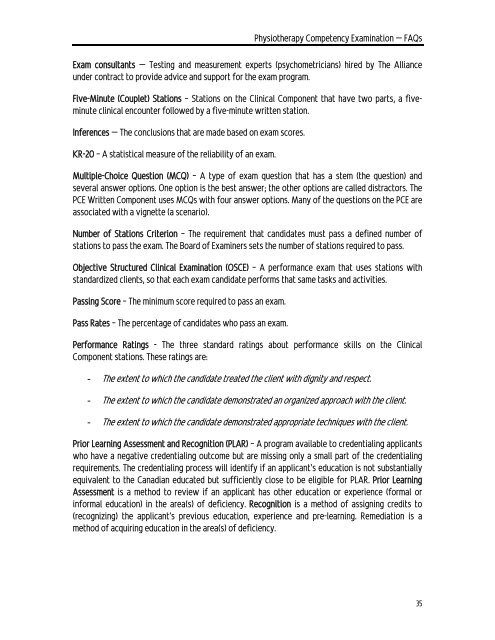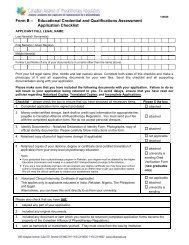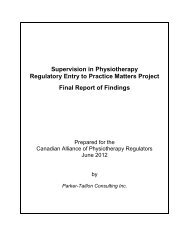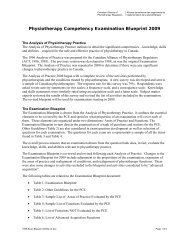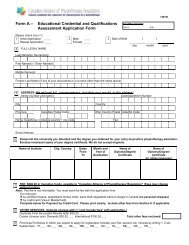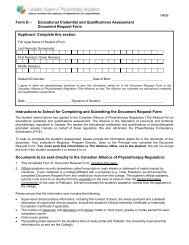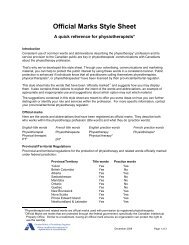Frequently Asked Questions - Canadian Alliance of Physiotherapy ...
Frequently Asked Questions - Canadian Alliance of Physiotherapy ...
Frequently Asked Questions - Canadian Alliance of Physiotherapy ...
You also want an ePaper? Increase the reach of your titles
YUMPU automatically turns print PDFs into web optimized ePapers that Google loves.
<strong>Physiotherapy</strong> Competency Examination — FAQs<br />
Exam consultants — Testing and measurement experts (psychometricians) hired by The <strong>Alliance</strong><br />
under contract to provide advice and support for the exam program.<br />
Five-Minute (Couplet) Stations – Stations on the Clinical Component that have two parts, a fiveminute<br />
clinical encounter followed by a five-minute written station.<br />
Inferences — The conclusions that are made based on exam scores.<br />
KR-20 – A statistical measure <strong>of</strong> the reliability <strong>of</strong> an exam.<br />
Multiple-Choice Question (MCQ) – A type <strong>of</strong> exam question that has a stem (the question) and<br />
several answer options. One option is the best answer; the other options are called distractors. The<br />
PCE Written Component uses MCQs with four answer options. Many <strong>of</strong> the questions on the PCE are<br />
associated with a vignette (a scenario).<br />
Number <strong>of</strong> Stations Criterion – The requirement that candidates must pass a defined number <strong>of</strong><br />
stations to pass the exam. The Board <strong>of</strong> Examiners sets the number <strong>of</strong> stations required to pass.<br />
Objective Structured Clinical Examination (OSCE) – A performance exam that uses stations with<br />
standardized clients, so that each exam candidate performs that same tasks and activities.<br />
Passing Score – The minimum score required to pass an exam.<br />
Pass Rates – The percentage <strong>of</strong> candidates who pass an exam.<br />
Performance Ratings - The three standard ratings about performance skills on the Clinical<br />
Component stations. These ratings are:<br />
- The extent to which the candidate treated the client with dignity and respect.<br />
- The extent to which the candidate demonstrated an organized approach with the client.<br />
- The extent to which the candidate demonstrated appropriate techniques with the client.<br />
Prior Learning Assessment and Recognition (PLAR) – A program available to credentialing applicants<br />
who have a negative credentialing outcome but are missing only a small part <strong>of</strong> the credentialing<br />
requirements. The credentialing process will identify if an applicant’s education is not substantially<br />
equivalent to the <strong>Canadian</strong> educated but sufficiently close to be eligible for PLAR. Prior Learning<br />
Assessment is a method to review if an applicant has other education or experience (formal or<br />
informal education) in the area(s) <strong>of</strong> deficiency. Recognition is a method <strong>of</strong> assigning credits to<br />
(recognizing) the applicant's previous education, experience and pre-learning. Remediation is a<br />
method <strong>of</strong> acquiring education in the area(s) <strong>of</strong> deficiency.<br />
35


